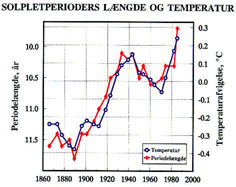The Earth Is Warmed by the Sun, and other Inconvenient Truths
 The Earth is located at a fortuitous distance from the sun. Solar irradiation combined with greenhouse gases such as water and CO2 provide the earth with a life-sustaining, though normally variable, climate. Current warming trends in global climate require explanations, and good scientists do not limit their hypotheses unnecessarily. In other words, since climate is a complex outcome of several variables with complex and poorly understood interactions between the variables, we are likely to be surprised by actual climate change if we are looking at only one variable in the equation.
The Earth is located at a fortuitous distance from the sun. Solar irradiation combined with greenhouse gases such as water and CO2 provide the earth with a life-sustaining, though normally variable, climate. Current warming trends in global climate require explanations, and good scientists do not limit their hypotheses unnecessarily. In other words, since climate is a complex outcome of several variables with complex and poorly understood interactions between the variables, we are likely to be surprised by actual climate change if we are looking at only one variable in the equation.It is extremely unlikely that greenhouse gas emissions will be decreasing within the next two or three decades (unless there is a massive worldwide recession), so the first thing that comes to mind that might destroy the current correlation between temperature rise and CO2 concentration increases, would be a drop in solar output.
General Circulation Models (GCMs) of climate typically consider solar output to be a constant, and greenhouse gases to be the only possible significant variable to have changed enough to impact climate. This assumption of constancy is quite convenient for those modelers whose living is based upon proving the greenhouse gas forcing (ggf) theory of climate change. Not because there cannot be more than one force acting on the climate at one time, but because in pragmatic terms, nothing must be allowed to steal the spotlight from the ggf theory.
 Not surprisingly, astrophysicists and solar scientists take a somewhat different view of solar "constancy." They say it is wrong. This is an inconvenient bit of data for professional climate modelers and scaremongers, so it is ignored. Nevertheless, it is fascinating to consider that solar variability combined with several other factors--including greenhouse gases--generates climate change. Fixating on one cause is fine if you are a professional lobbyist for an environmental organisation, or if you are making films to try to help your presidential bid, or if your living well depends on keeping one particular theory of climate change front and center--but if you are interested in truths of all kinds, including inconvenient truths, you actually must include other hypotheses.
Not surprisingly, astrophysicists and solar scientists take a somewhat different view of solar "constancy." They say it is wrong. This is an inconvenient bit of data for professional climate modelers and scaremongers, so it is ignored. Nevertheless, it is fascinating to consider that solar variability combined with several other factors--including greenhouse gases--generates climate change. Fixating on one cause is fine if you are a professional lobbyist for an environmental organisation, or if you are making films to try to help your presidential bid, or if your living well depends on keeping one particular theory of climate change front and center--but if you are interested in truths of all kinds, including inconvenient truths, you actually must include other hypotheses.Current fixation on carbon dioxide to the exclusion of other factors, leads to an over-simplification of outlook. Clearly greenhouse gases magnify the heating effects of solar irradiation. But what is the effect of different concentrations of CO2 on heat trapping, and how is that modified by the actions of water, aerosols, ocean temperatures and currents, ground vegetation layer, surface albedo, and other factors--some of them as of yet unknown?
In other words, once you know that one element of climate warming involves greenhouse gases, and one greenhouse gas that is increasing in concentration is CO2, where do you go from there. A rational person will not go where Al Gore goes, but then that is not surprising, judging from Mr. Gore's past antics and claims--particularly in light of the transparent propaganda methods utilised in his recent film. But a rational person who is seeking explanations must continue looking.
Because the truth underlying all the propaganda and politics is much more interesting than most "environmentalists" could possibly understand. The climate will change. The climate has always changed. We are told that "global warming" can lead to unpredictable warming or cooling. This may appear paradoxical, but it is only a way of covering all the bases.
If greenhouse gases in fact magnify the sun's warming effect in a non-linear way, it is easily conceivable that a reduction in solar output could lead to much greater cooling than would be expected from the change in solar output. Conversely, much greater heating is possible due to greenhouse gas effect.
The fact that CO2 and temperature change are not perfectly correlated over time suggests that other significant variables are involved. GCM models ignore other variables, or make unfounded assumptions about them which affect the reliability of the projections.
How much will meeting Kyoto targets slow warming? Very little if any. It all depends on the exact degree of forcing caused by CO2, and no one knows that. Meanwhile, climatologists and environmental charities/lobbies are doing very well financially, with sloppy models, bad assumptions, and poor technique. Can you really blame Al Gore for wanting to get in on the action?
Labels: CAGW, global cooling, Sol

0 Comments:
Post a Comment
“During times of universal deceit, telling the truth becomes a revolutionary act” _George Orwell
<< Home